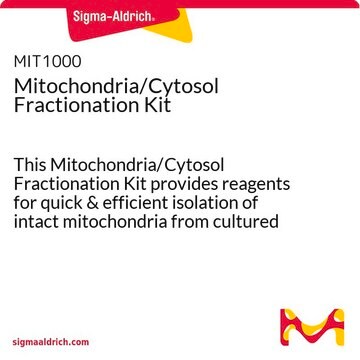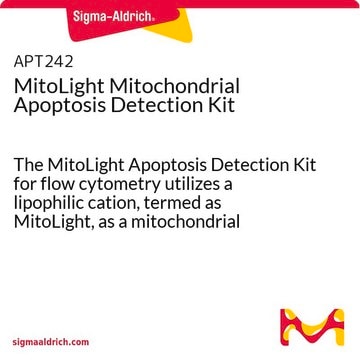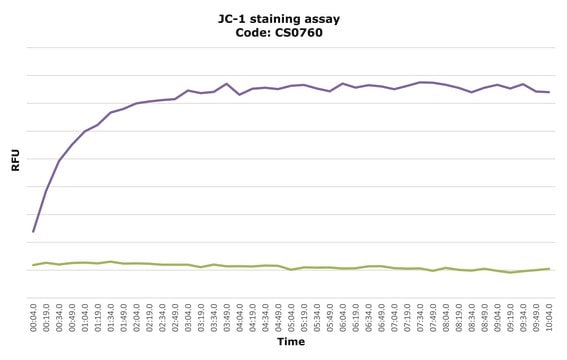MAK147
Mitochondrion Membrane Potential Kit
sufficient for 500 fluorometric tests (orange fluorescence, microplate readers)
Se connecterpour consulter vos tarifs contractuels et ceux de votre entreprise/organisme
About This Item
Code UNSPSC :
12161503
Nomenclature NACRES :
NA.25
Produits recommandés
Utilisation
sufficient for 500 fluorometric tests (orange fluorescence, microplate readers)
Méthode de détection
fluorometric
Maladie(s) pertinente(s)
cancer
Température de stockage
−20°C
Description générale
Mitochondria generate a potential across their membranes due to the activities of enzymes of the electron transport chain. During apoptosis, collapse of the mitochondrial membrane potential (MMP) coincides with the opening of the mitochondrial permeability transition pores, leading to the release of cytochrome c into the cytosol, which in turn triggers other downstream events in the apoptotic cascade.
Application
Mitochondrion Membrane Potential Kit has been used to estimate the mitochondrion membrane potential in chinese hamster ovary (CHO) cells. It has been used in the permeabilization of the mitochondrial membrane test (MMP assay) and also used to detect the loss of mitochondrial membrane permeabilization.
Adéquation
This kit is suitable for the detection of mitochondrial membrane potential (MMP) in mammalian cells and for screening apoptosis inhibitors and activators using microplate readers.
Principe
Mitochondrion Membrane Potential Kit is optimized for the detection of the loss of the MMP in cells. The cationic hydrophobic mitochondrial potential dye accumulates in normal mitochondria, most likely due to the mitochondrial potential, resulting in an increase in fluorescence (λex = 540/λem = 590 nm). In apoptotic cells, MMP collapse results in decreased fluorescence. This kit can be used for monitoring apoptosis and for screening apoptosis inhibitors and activators.
Code de la classe de stockage
10 - Combustible liquids
Classe de danger pour l'eau (WGK)
WGK 1
Point d'éclair (°F)
Not applicable
Point d'éclair (°C)
Not applicable
Certificats d'analyse (COA)
Recherchez un Certificats d'analyse (COA) en saisissant le numéro de lot du produit. Les numéros de lot figurent sur l'étiquette du produit après les mots "Lot" ou "Batch".
Déjà en possession de ce produit ?
Retrouvez la documentation relative aux produits que vous avez récemment achetés dans la Bibliothèque de documents.
Les clients ont également consulté
Ngoc An Le et al.
Journal of medicinal chemistry, 64(10), 6792-6801 (2021-05-15)
Photodynamic therapy (PDT) is used to treat various cancerous diseases. Recently, we have demonstrated that platinated pyridyl-substituted porphyrins are potent agents for PDT with very high phototoxicity (IC50 down to 17 nM) and excellent phototoxic indices of higher than 5800
A Zombie LIF Gene in Elephants Is Upregulated by TP53 to Induce Apoptosis in Response to DNA Damage.
Juan Manuel Vazquez et al.
Cell reports, 24(7), 1765-1776 (2018-08-16)
Large-bodied organisms have more cells that can potentially turn cancerous than small-bodied organisms, imposing an increased risk of developing cancer. This expectation predicts a positive correlation between body size and cancer risk; however, there is no correlation between body size
New metalo-therapeutics of NSAIDs against human breast cancer cells.
Banti C N, et al.
European Journal of Medicinal Chemistry, 143, 1687-1701 (2018)
A zombie LIF gene in elephants is upregulated by TP53 to induce apoptosis in response to DNA damage
Vazquez J M, et al.
Cell Reports, 24(7), 1765-1776 (2018)
George K Latsis et al.
International journal of molecular sciences, 19(7) (2018-07-18)
Two known tin-based polymers of formula {[R₃Sn(CH₃COO)]n} where R = n-Bu⁻ (1) and R = Ph⁻ (2),were evaluated for their in vitro biological properties. The compounds were characterized via their physical properties and FT-IR, 119Sn Mössbauer, and ¹H NMR spectroscopic
Notre équipe de scientifiques dispose d'une expérience dans tous les secteurs de la recherche, notamment en sciences de la vie, science des matériaux, synthèse chimique, chromatographie, analyse et dans de nombreux autres domaines..
Contacter notre Service technique







